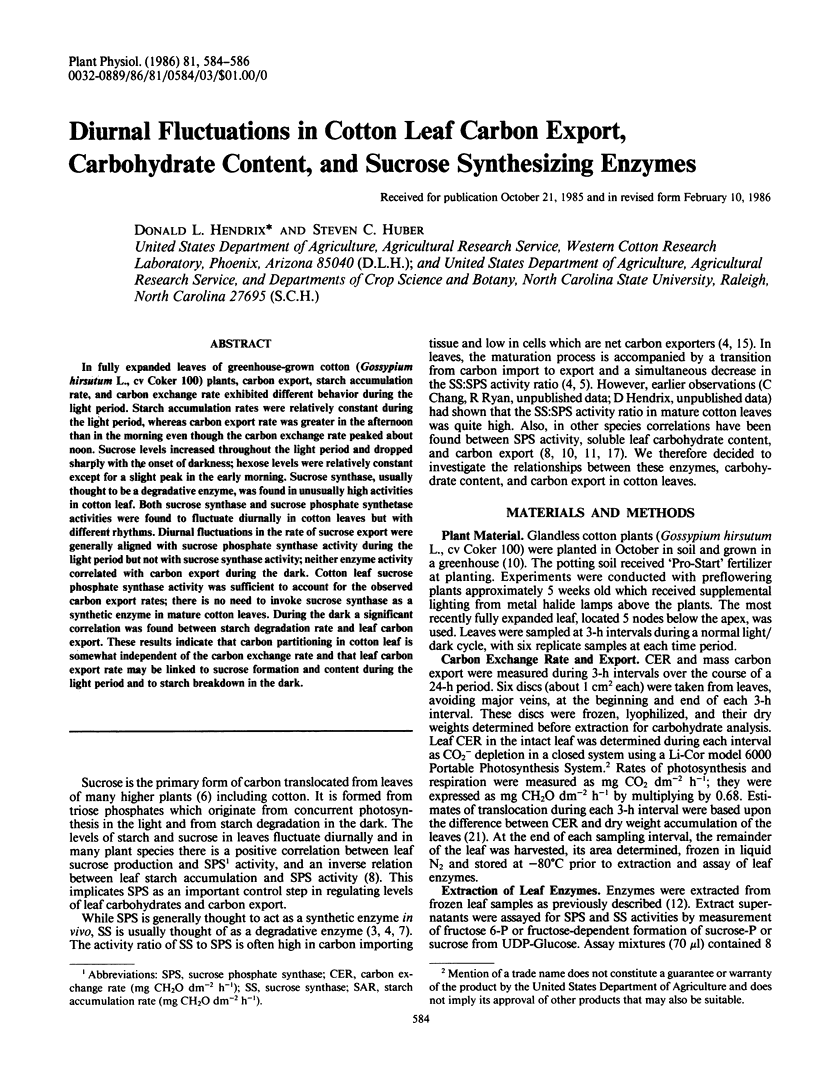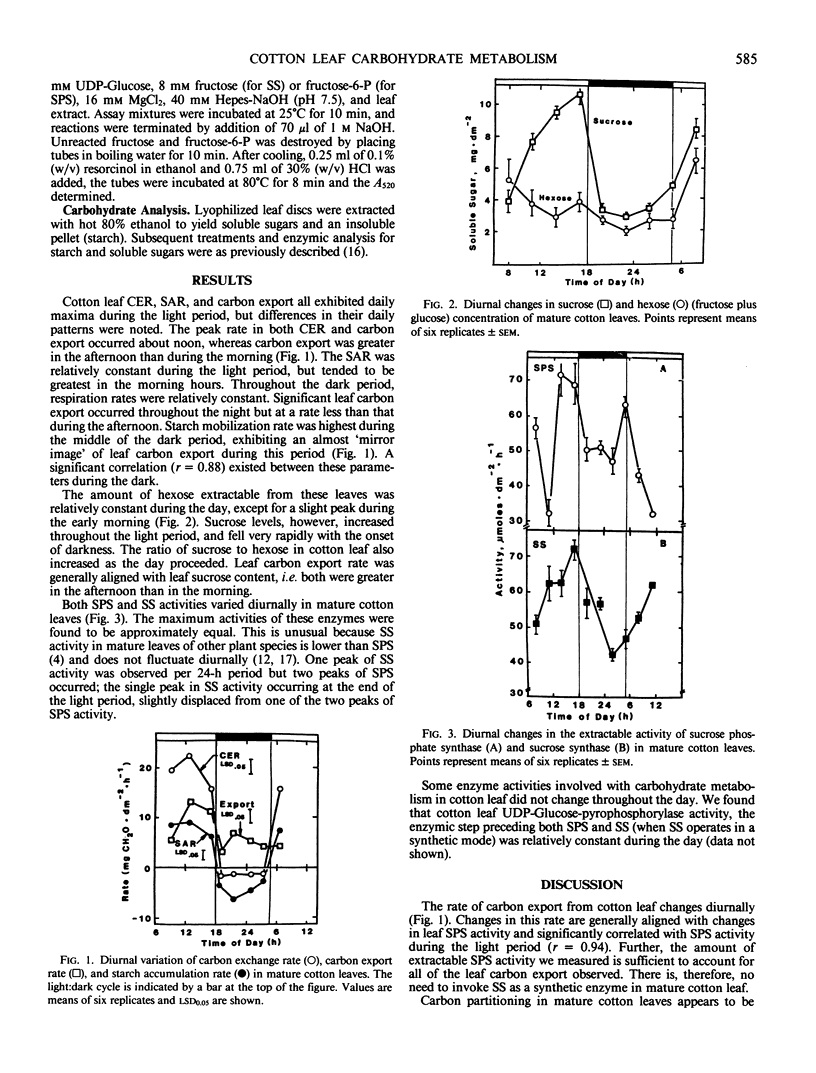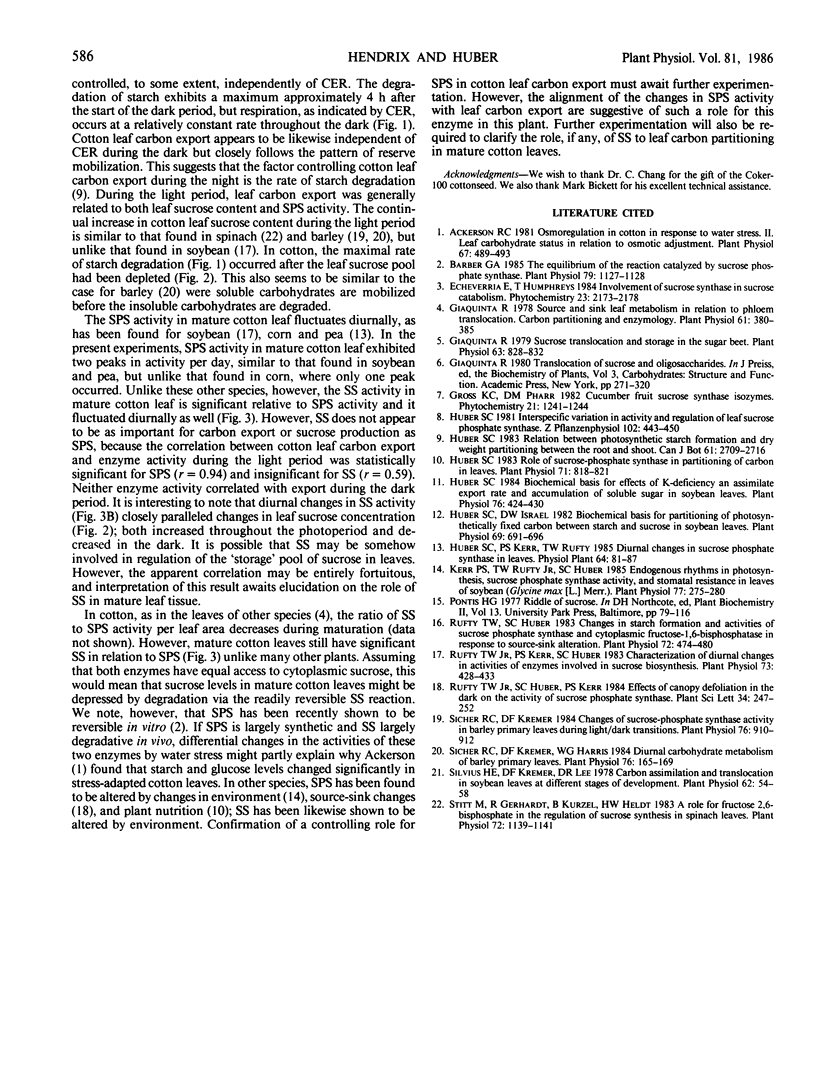Abstract
In fully expanded leaves of greenhouse-grown cotton (Gossypium hirsutum L., cv Coker 100) plants, carbon export, starch accumulation rate, and carbon exchange rate exhibited different behavior during the light period. Starch accumulation rates were relatively constant during the light period, whereas carbon export rate was greater in the afternoon than in the morning even though the carbon exchange rate peaked about noon. Sucrose levels increased throughout the light period and dropped sharply with the onset of darkness; hexose levels were relatively constant except for a slight peak in the early morning. Sucrose synthase, usually thought to be a degradative enzyme, was found in unusually high activities in cotton leaf. Both sucrose synthase and sucrose phosphate synthetase activities were found to fluctuate diurnally in cotton leaves but with different rhythms. Diurnal fluctuations in the rate of sucrose export were generally aligned with sucrose phosphate synthase activity during the light period but not with sucrose synthase activity; neither enzyme activity correlated with carbon export during the dark. Cotton leaf sucrose phosphate synthase activity was sufficient to account for the observed carbon export rates; there is no need to invoke sucrose synthase as a synthetic enzyme in mature cotton leaves. During the dark a significant correlation was found between starch degradation rate and leaf carbon export. These results indicate that carbon partitioning in cotton leaf is somewhat independent of the carbon exchange rate and that leaf carbon export rate may be linked to sucrose formation and content during the light period and to starch breakdown in the dark.
Full text
PDF


Selected References
These references are in PubMed. This may not be the complete list of references from this article.
- Ackerson R. C. Osmoregulation in Cotton in Response to Water Stress : II. LEAF CARBOHYDRATE STATUS IN RELATION TO OSMOTIC ADJUSTMENT. Plant Physiol. 1981 Mar;67(3):489–493. doi: 10.1104/pp.67.3.489. [DOI] [PMC free article] [PubMed] [Google Scholar]
- Barber G. A. The equilibrium of the reaction catalyzed by sucrose phosphate synthase. Plant Physiol. 1985 Dec;79(4):1127–1128. doi: 10.1104/pp.79.4.1127. [DOI] [PMC free article] [PubMed] [Google Scholar]
- Giaquinta R. T. Sucrose translocation and storage in the sugar beet. Plant Physiol. 1979 May;63(5):828–832. doi: 10.1104/pp.63.5.828. [DOI] [PMC free article] [PubMed] [Google Scholar]
- Giaquinta R. Source and sink leaf metabolism in relation to Phloem translocation: carbon partitioning and enzymology. Plant Physiol. 1978 Mar;61(3):380–385. doi: 10.1104/pp.61.3.380. [DOI] [PMC free article] [PubMed] [Google Scholar]
- Huber S. C. Biochemical basis for effects of k-deficiency on assimilate export rate and accumulation of soluble sugars in soybean leaves. Plant Physiol. 1984 Oct;76(2):424–430. doi: 10.1104/pp.76.2.424. [DOI] [PMC free article] [PubMed] [Google Scholar]
- Huber S. C., Israel D. W. Biochemical Basis for Partitioning of Photosynthetically Fixed Carbon between Starch and Sucrose in Soybean (Glycine max Merr.) Leaves. Plant Physiol. 1982 Mar;69(3):691–696. doi: 10.1104/pp.69.3.691. [DOI] [PMC free article] [PubMed] [Google Scholar]
- Huber S. C. Role of sucrose-phosphate synthase in partitioning of carbon in leaves. Plant Physiol. 1983 Apr;71(4):818–821. doi: 10.1104/pp.71.4.818. [DOI] [PMC free article] [PubMed] [Google Scholar]
- Kerr P. S., Rufty T. W., Huber S. C. Endogenous Rhythms in Photosynthesis, Sucrose Phosphate Synthase Activity, and Stomatal Resistance in Leaves of Soybean (Glycine max [L.] Merr.). Plant Physiol. 1985 Feb;77(2):275–280. doi: 10.1104/pp.77.2.275. [DOI] [PMC free article] [PubMed] [Google Scholar]
- Rufty T. W., Huber S. C. Changes in Starch Formation and Activities of Sucrose Phosphate Synthase and Cytoplasmic Fructose-1,6-bisphosphatase in Response to Source-Sink Alterations. Plant Physiol. 1983 Jun;72(2):474–480. doi: 10.1104/pp.72.2.474. [DOI] [PMC free article] [PubMed] [Google Scholar]
- Rufty T. W., Kerr P. S., Huber S. C. Characterization of diurnal changes in activities of enzymes involved in sucrose biosynthesis. Plant Physiol. 1983 Oct;73(2):428–433. doi: 10.1104/pp.73.2.428. [DOI] [PMC free article] [PubMed] [Google Scholar]
- Sicher R. C., Kremer D. F. Changes of Sucrose-Phosphate Synthase Activity in Barley Primary Leaves during Light/Dark Transitions. Plant Physiol. 1984 Dec;76(4):910–912. doi: 10.1104/pp.76.4.910. [DOI] [PMC free article] [PubMed] [Google Scholar]
- Sicher R. C., Kremer D. F., Harris W. G. Diurnal carbohydrate metabolism of barley primary leaves. Plant Physiol. 1984 Sep;76(1):165–169. doi: 10.1104/pp.76.1.165. [DOI] [PMC free article] [PubMed] [Google Scholar]
- Silvius J. E., Kremer D. F., Lee D. R. Carbon assimilation and translocation in soybean leaves at different stages of development. Plant Physiol. 1978 Jul;62(1):54–58. doi: 10.1104/pp.62.1.54. [DOI] [PMC free article] [PubMed] [Google Scholar]
- Stitt M., Gerhardt R., Kürzel B., Heldt H. W. A role for fructose 2,6-bisphosphate in the regulation of sucrose synthesis in spinach leaves. Plant Physiol. 1983 Aug;72(4):1139–1141. doi: 10.1104/pp.72.4.1139. [DOI] [PMC free article] [PubMed] [Google Scholar]


